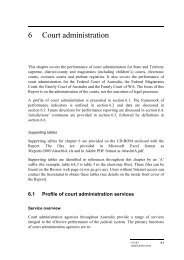Dr Linda Botterill and Professor Bruce Chapman (PDF - 74 Kb)
Dr Linda Botterill and Professor Bruce Chapman (PDF - 74 Kb)
Dr Linda Botterill and Professor Bruce Chapman (PDF - 74 Kb)
Create successful ePaper yourself
Turn your PDF publications into a flip-book with our unique Google optimized e-Paper software.
with the original intent of the National <strong>Dr</strong>ought Policy, ie ‘in a consistent, structured way<br />
rather than through ad hoc policy changes’ (Crean 1992).<br />
Farm exit<br />
Related to the assumption that farm poverty is the result of suboptimal rates of structural<br />
adjustment has been the ongoing use of re-establishment grants since the early 1970s as an<br />
incentive to marginal farmers to leave the l<strong>and</strong>. As has been argued in more detail elsewhere<br />
(<strong>Botterill</strong> 2001), re-establishment grants have been a policy failure. The 1997 review of the<br />
Rural Adjustment Scheme noted that ‘there is no objective evidence that the availability of<br />
re-establishment grants has been a major factor in decisions by farmers to leave agriculture’<br />
(McColl et al. 1997, p 51) <strong>and</strong> a review of the scheme in 2000 found that as many as 79% of<br />
those who accepted the grant would have left the l<strong>and</strong> anyway (O'Neil et al. 2000, p iv). The<br />
main problem with the exit grant program appears to be the mismatch between the monetary<br />
incentive on offer <strong>and</strong> the very strong non-monetary reasons farmers stay in agriculture even<br />
in the face of considerable hardship. There is no good public policy reason to continue to<br />
offer these grants. If the government wishes to encourage marginal operators to leave<br />
agriculture, research is needed into the types of incentives that are likely to achieve that<br />
outcome.<br />
It is therefore recommended that<br />
the re-establishment grant be abolished.<br />
Farm business support: Farm Management Deposits<br />
Farm Management Deposits are a tax-effective mechanism for farmers to accumulate<br />
financial reserves during high revenue years for use during downturns. They are consistent<br />
with the National <strong>Dr</strong>ought Policy’s objectives of self reliance <strong>and</strong> risk management. However,<br />
in recent years they have been exempted from eligibility criteria for EC support. It is<br />
important that FMDs are seen as the main mechanism for supporting farmers to manage their<br />
cash flow across the climate cycle so they should be included in the means test for any form<br />
of business support offered during downturn. It is often asserted that farmers should not be<br />
required to access FMDs because they are a form of superannuation. This is a spurious<br />
argument. Changes to superannuation in recent years provide all members of the community<br />
with a range of choices for the accumulation of retirement savings <strong>and</strong> these are equally<br />
available to farmers. FMDs were not set up for this purpose.<br />
It is recommended that<br />
Farm Management Deposits be retained to support income management across<br />
the climate cycle;<br />
Farm Management Deposits be included in the means test for any support<br />
offered to farm businesses during downturns.<br />
Farm business support: Income Contingent Loans<br />
The main policy instrument employed by the Commonwealth government to support farm<br />
businesses experiencing exceptional circumstances is the interest rate subsidy. Interest rate<br />
subsidies have been part of government structural adjustment policy for decades. They have<br />
attracted criticism by previous reviews, with the 1997 review of the Rural Adjustment Scheme<br />
arguing that ‘the payment of exceptional circumstances interest rate subsidies is inconsistent<br />
with the broader […] objectives of encouraging self-reliance’. The review also found that<br />
<strong>Botterill</strong> <strong>and</strong> <strong>Chapman</strong> Page 5
















